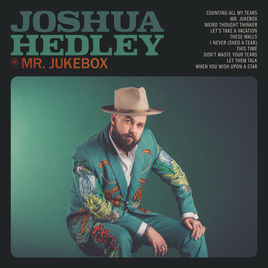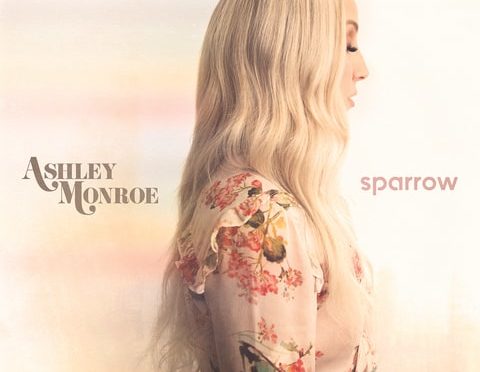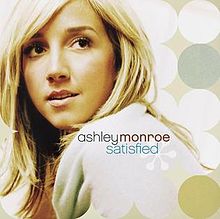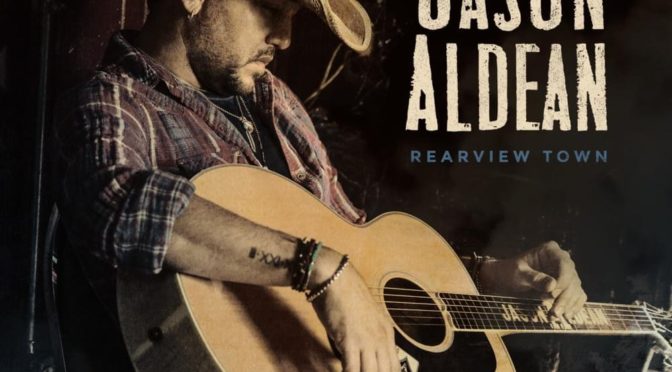Joshua Hedly’s debut album Mr. Jukebox is one that was an interesting listen for us both. It’s very cool that it’s so traditional, but it leads to a lot of the same authenticity debates that have been plaguing country, and whether something has to be completely traditional-sounding to be considered “real country.” It brought up some interesting discussion points, particularly as we both liked the album less with more listens.
Conversation
Megan: So let’s talk about the parts of this album we did enjoy, because it was kind of a strange experience for us both over the course of listening to it. I know a big draw obviously for you would be the sound.
Brianna: Oh yes, the sound played a big part in my feelings toward this album. Right away, it was easy to see that this would be very traditional. I loved the piano, fiddle, and steel guitar used throughout. It all really goes back to the 50s and 60s, and the sounds that were popular then.
Megan: It goes back to that in such a way that I can’t help but be impressed by it. Even down to his inflections and phrasing, it sounds classic. I wasn’t a huge fan of his voice like I know you were, but he definitely is convincing at the style.
Brianna: I agree about it being really convincing, as far as the musical tone. As for his voice, you’re right. I was really impressed at his talent. He’s just a singer who I really appreciate, and for me, when I can find someone who is working within the field of traditional country, and also has singing talent, I’m a happy camper.
Megan: I mean, I wasn’t moved either way by his voice. Not especially great or especially bad, at least for me. For me, it was the songwriting I initially liked. I shouldn’t say initially, I still do like a lot of these songs on paper. The first time I listened to this, it didn’t blow me away, but I thought it was solid. Was it like that for you? You probably actually liked it better than me at first.
Brianna: Oh yeah, at first, I was ready to be blown away. Hearing him sing on “Counting All My Tears”, I just knew it was going to be great. So, when I was first listening to this, I sort of liked it more. But the more I listened to the album, the weaker it became. Yes, I still like it, but now? Not as much. I’d say for me, about four of these songs really stand out completely.
Megan: Which songs? And what made it weaker? I know it got weaker for both of us, but I think we’ve got somewhat different reasons for that.
Brianna: I love “Counting All My Tears” for its slower tempo, as well as the way his voice just fits with the song. It’s really the only one of the slower songs I believe in. I could really be convinced that he’s really sad about his past relationship not working out. “These Walls” is one I like, just because he’s saying that the walls could tell a story about a relationship gone wrong. I love the upbeat “Let Them Talk”, just because the narrator doesn’t care about what others say, he’s happy with the woman he’s found. My favorite is the title track, though. “Mr. Jukebox” is awesome, as it’s from the perspective of the jukebox, telling stories about all the people around it.
What made it weaker was the fact that I honestly started finding the other songs sleepy or uninteresting. A lot of them are slower, but just because a song is slow doesn’t mean it has to be sleepy. Plus, a lot of these songs are about pain or trying to fix a relationship, and bored is the last thing I should feel. What about you? What are your standouts, and what brought this album down for you?
Megan: Slow songs don’t have to be sleepy is a great point. Jason Eady is the poster child of this quote. Anyway, I agree wholeheartedly that “Mr. Jukebox” is the best. It was the lead-off song and had me really excited for this. He’s best doing this sort of upbeat, shuffling traditional thing. Also agree on “Let Them Talk.” As for the slower songs, I enjoy the lyrics of “Weird Thought Thinker” quite a bit. I think I’d like this more in another singer’s hands. “Counting All My Tears” I’d agree on as well, I think he does sound more convincing in that one.
Which leads me to my biggest issue. It’s so caught up in trying to be traditional that it just feels like he’s doing a style. As we’ve pointed out, he’s doing it flawlessly, but I really don’t feel like I know much about Joshua Hedley after this other than that he really likes and respects traditional country. There’s nothing wrong with recreating this style, that’s what Zephaniah Ohora did last year on an album we both love. You loved Zephaniah long before me, so you’re probably a better authority on this, but I believe him when he sings. Not every word and phrase and chorus is throwback just for the sake of it.
Brianna: Oh yes. I believe what Zephaniah sings. I don’t, however, believe everything Joshua sings. I’m just not convinced he felt the emotion in the songs, and if the artist is lukewarm on a subject, it will likely rub off on the listener. Or, at least, to my way of thinking. For all I know, he isn’t lukewarm on the topics; it’s just how it comes across to me. Like he’s just going through the motions.
Megan: Do you think it’s a problem with how traditional and not contemporary he’s trying to be, or just more of a problem of him not really finding his sound as an artist? I guess what I mean is, do you think if he develops his songwriting and gives us more originality, he can release a 2nd album with this throwback sound and have it work in this day and age?
Brianna Well, if he released an album with more originality, but with the same kind of sound? I’d be all over it. Lol. Honestly, though, I think it might be both that he felt like he had to use the style he did, and that he is still trying to find his sound. I think he has a lot of potential, and I am interested to see what he comes up with next, I just hope that he doesn’t limit himself as he did on Mr. Jukebox.
Megan: Honestly, I don’t know. I thought at first it was just because of how identical he was trying to be to this style, but Colter Wall sings lines like “drew myself up” and “I made for the creek,” and for me, his music comes off timeless rather than dated. Same with Zephaniah Ohora, although his songwriting is more modern. This feels dated somehow. I wanted to like this more than I do, and I agree that he’s got a ton of potential. The opportunities he’s already had by releasing an album like this in 2018 on Third Man Records are encouraging. I guess I like him and the idea of it all more than the album, lol.
Brianna: I’m not a Colter fan, but I do like that sort of older language. It makes things feel more authentic. That’s always great.
But I agree, I like the idea of this more than the actual album, and that’s disappointing, as a traditional country fan.
Megan: It’s also disappointing because there’s not really one moment I don’t like here, except the awkward cover of “When You Wish Upon a Star.” But other than that, there’s nothing really awful about any of it individually, it’s just an overarching problem.
Overall, I am impressed by the sound and the production and the songwriting. I think Hedley has a lot of potential, and I’m glad to see an album like this get made in 2018. It’s still a positive thing as a whole and has some standout songs, but it lacks identity. I want to hear more Joshua Hedley next time to build on this very cool foundation. Solid 6 from me, I think.
Brianna: That’s a great point that should be made, that nothing is awful about this album. Like you, my only real awkward moment is “When You Wish Upon A Star”, but that’s both because it’s a cover, and also due to the jazz atmosphere of it. Like you, I’d love to hear more of himself on his next album, but I’m also encouraged at seeing something so blatantly traditional be pushed so much this year. I’d like to go with a 7, but I believe a more accurate rating for this would be 6.5, simply due to the fact that I don’t love over half of the album. Still, this is something I recommend any traditional country fan should check out. It’s very possible you all may have different opinions than Megan and myself.
Ratings
Brianna: 6.5/10
Megan: 6/10




